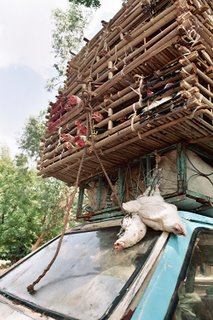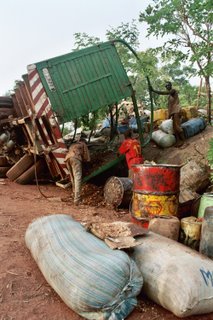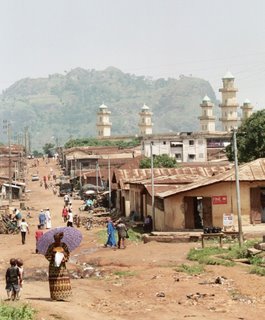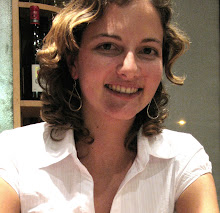
This is a story I wrote for the Christian Science Monitor last year, when the fate of the three shipyards in Gdansk, Gdynia and Szczecin was still in question. These days the situation looks bleaker. The EC ruled against the Polish Treasury's re-structuring proposal, and the Gdynia and Szczecin yards are being auctioned off -- no one knows if the buyer will want to continue building ships, or do something else entirely with the land. As for Gdansk, it's been sold to a Ukrainian steel company. When I spoke to the shipyard artists last year, they showed me tentative plans for the proprty -- it seems the company would like to build a shopping center there.
So capitalism is eating the shipyards at last. It's an ironic historical twist, and a sad one.
**********************************
When Michal Szlaga got his first job at the Gdansk shipyards five years ago he was fresh out of the arts academy, a struggling photographer desperate for money. He was hired as a shipyard painter, a job that required getting up at 4am for a day of punishing manual labor in the harsh winter of northern Poland. One morning he woke up crying.
He lasted eight days. Then he quit.
But Mr. Szlaga couldn’t leave; he may not have been able to hack it as a painter, but as a photographer he was hooked. This giant industrial complex – site of the beginning of the end of the Communist Bloc -- holds a hallowed place in Poland’s collective memory, even as it disappears into the pages of history and off this nation’s economic map.
“These are the most recognized shipyard workers in the world. They are heroes for some people,” he says, explaining why he traded in the winches and blowtorches for his camera and began to wander the shipyard grounds documenting the men and women who spent their lives there. “I realized I could only take pictures. It’s all I could do here, really.”
He’s not alone. Over the past seven years an entire colony of artists like him came to live and work among the 19th century buildings and towering cranes.
For Poland, indeed for most of the Western world, the Gdansk shipyards are much more than
 just a place to build ships – they are the cradle of the legendary Solidarity Movement, where in 1980 an electrician named Lech Walesa led 17,000 workers in a series of strikes that triggered the disintegration of the Soviet Union. Solidarity went on to become a powerful political force, launching Mr. Walesa into international prominence. It won him a Nobel Peace Prize in 1983; seven years later, it won him the Polish presidency.
just a place to build ships – they are the cradle of the legendary Solidarity Movement, where in 1980 an electrician named Lech Walesa led 17,000 workers in a series of strikes that triggered the disintegration of the Soviet Union. Solidarity went on to become a powerful political force, launching Mr. Walesa into international prominence. It won him a Nobel Peace Prize in 1983; seven years later, it won him the Polish presidency.Today the shipyards are fighting once again, but this time it’s for their very survival. Financially stricken by the breakup of the Soviet Union and rapid privatization, they built just five ships last year, down from 35 a year during the 1970s. Where 20,000 men once worked among the massive cranes and bricks, today there are around 3,000.
There’s a very real possibility they’ll soon close down completely.
It’s a call to action for Szlaga. “This place is an obsession because it’s disappearing,” he says. “The more it disappears, the more photos I want to take. They keep knocking down buildings so I feel like I have to.”
Looking through his pictures, you start to understand: faces covered in grease and creased by decades of hard labor look directly into the camera, unsmiling. These are stark images of shipyard work – men and metal in a surreal landscape of oversized machinery and crumbling brick. In the age of modern technology, this is a vanishing world.
This year, Szlaga’s industrial photography won a prestigious Lucie Award, and his work has been shown in New York, Austria and Sweden.
This marriage of art and industry began in 2001, when shipyard management decided to rejuvenate the grounds by renting cheap studios to artists. Szlaga and 25 others moved in, forming an artists’ colony of photographers, painters, dancers and architects. They all lived and worked together in a building only a few hundred feet from where Walesa signed his landmark agreements with the communist authorities.
“We were the first [artists] here,” explains Szlaga. “That’s why people were so enthusiastic about creating something. The atmosphere was magic, extraordinary.”
For other shipyard artists, the appeal of the derelict buildings and soaring cranes is less historical than physical. Konrad Zientara, an architect, has been living on the grounds for five years, and for him the allure of the shipyards is in “the space, the views, the holes, the cranes, the platforms that carry pieces of ships, the special things that are only here ... people don’t see the space and the beauty of it, because the only thing you hear about is the history,” he complains. “The events were important, but I think the place suffers from them.”
If the place suffers, the shipyard workers suffer more. Many of the original leaders of Solidarity are still doing the same jobs they were doing three decades ago: riveting, painting, and welding ships. In 2005, when the Polish political elite descended on Gdansk to mark the 25th anniversary of the strikes with elaborate processions and ceremonies, the workers themselves were urged to stay home.
“I think people like to remember symbols, but the symbolic worker isn’t connected to the real worker,” muses Zientara. Seen as grimy, uneducated, and often drunk, today’s shipyard mechanic or painter isn’t considered fit to be a national icon.
It is precisely this reality gap that many of the resident artists are attempting to bridge. In a northern neighborhood of Gdansk, an area overgrown with weeds and fronted by abandoned brick tenements, a mural by Iwona Zajac stretches along a wall by the side of the road. In simple black and blue, the artist intersperses shipyard scenes with the words of the workers themselves – most filled with memories and fierce sense of belonging. “I never thought I would work for 42 years in the same place,” reads one; another states proudly, “I have a feeling there’s a piece of me in every ship we built.” One universal sentiment is: “I will miss the place. When I retire I won’t know what to do with myself.”
 The mural has become a favorite among the workers.
The mural has become a favorite among the workers.“When I walk along the wall I feel like crying, because it’s the truth,” says Zbyszek Stefanski, a ship painter since 1974. “The artists are great! Young people who had no idea what was going on in here did a lot of good for the shipyards.”
But those halcyon days are coming to an end. Last January the artists’ colony was broken up to make room for offices, and the artists themselves were obliged to find new studios. Some, like Szlaga, stayed on the shipyard grounds; others moved away.
The yards themselves may face an even bleaker future.
In an ironic twist, the very same victory that ensured the Gdansk shipyards a place in history is also destroying them. The ships they built were destined for the Soviet Union, and since the collapse of the USSR the yards have struggled to compete in other markets. State aid has kept them afloat, but Poland joined the European Union in 2004 and is now forced to adhere to Europe’s more stringent regulations regarding free market competition.
Earlier this month the Polish Treasury, in a last-ditch effort to save the yards, submitted a final restructuring plan to the European Commission. If it isn’t approved, the Gdansk shipyards will be ordered to pay back the $300 million in state aid they’ve received over the years. It’s money they simply don’t have. Such a ruling would mean almost certain bankruptcy, and an end to building ships.
•••
On September 9th, several hundred people gathered at the foot of Gdansk’s Monument to Fallen Shipyard Workers to protest the potential closure of the yards. Emotions were running high. At the edge of the crowd stood 68 year-old Pawel Zinczuk, his white hair and frail frame at odds with the burly men surrounding him. Zinczuk’s shipyard career spanned 35 years. In 1980 he was one of the key strike organizers and spent six months in prison for dissident activities.
When asked how he felt about the current situation his eyes filled with tears. “I’ll put it this way,” he said quietly: “In 1996 I was laid off. After my last day I sat on this monument for three hours, and I was so upset I had a heart attack. It’s a very hard time for me now because I feel the same way ... the shipyard was my family and my home.”
Several years ago the resident artists organized an exhibition called “Dockwatchers,” a collection of works underscoring their ambivalence toward the legend of Solidarity and the course of recent history.
Szlaga’s photographs were there, among them a portrait of working-class hero Anna Walentynowicz whose radical politics and consequent dismissal ignited the 1980 strikes. In the picture, she stands beneath the mouldering brick arches and broken windows of a crumbling shipyard building, a diminutive elderly lady with a fierce look in her eyes.
Walentynowicz was pushed from politics long ago. She seems to be suffering the same fate as the shipyards themselves, slipping slowly out of the present and into the annals of history.

Published Sept. 22 2008, Christian Science Monitor: http://features.csmonitor.com/backstory/2008/09/22/artists-try-to-save-gdansk-shipyards-%E2%80%93-in-images/





 Since its independence, Guinea has been a country of almost extraordinary peace. Despite its bellicose neighbors – Liberia, Sierra Leone, Cote d’Ivoire and Guinea Bissau all border – Guinea resisted all temptation to plunge into civil war, and even its token military coup was pulled off in 1984 with a minimum of bloodshed and comparatively few bruised egos.
Since its independence, Guinea has been a country of almost extraordinary peace. Despite its bellicose neighbors – Liberia, Sierra Leone, Cote d’Ivoire and Guinea Bissau all border – Guinea resisted all temptation to plunge into civil war, and even its token military coup was pulled off in 1984 with a minimum of bloodshed and comparatively few bruised egos.







